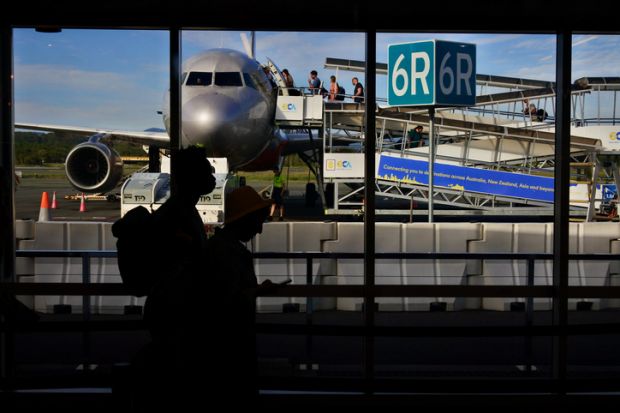Since the start of the 1990s, the flourishing demand for higher education has unleashed unprecedented growth of universities. But as this decade’s geopolitical tensions, economic fragmentation and cultural divisions deepen, Western universities are forced to manage more competitive student markets and their governments’ protectionist polices, while responding to an AI-driven technological revolution challenging the very model of university education.
Australian universities have been the greatest beneficiaries of globalisation. Australia’s international education has been fuelled by the burgeoning middle class in Asia and favourable regulations, linked with immigration policy. But as international student revenue grew, the government’s funding declined – creating a dependency on international income to support domestic demand.
Australian universities today have a dual personality. On the one hand they are self-regulating public institutions, expected to educate and support their local communities. On the other, many Australian universities are large international businesses employing thousands of staff, selling education products to thousands of customers and managing large property and investment portfolios.
These contradictions were manageable in the past three benign decades. But as fragmentation and geopolitical tensions gathered pace, the model has started to unravel.
First, starting from 2017 Australia’s pushback against China’s interference led by the Turnbull government revealed Australian universities’ vulnerabilities to China.
Then came the pandemic that emptied the campuses from new international students. As borders reopened, students returned. The calls for a more sustainable international education have drowned in the sea of new enrolments.
In 2022, the Albanese government was elected with a mandate to build Australia’s economic and security resilience. In foreign affairs, Australia has pursued an even deeper enmeshment with the US to counter China’s power, while investing in domestic defence capabilities.
With federal elections on the horizon to be fought over housing and immigration, the government picked a target that has surprisingly weak political influence – Australian universities.
By linking the housing crisis with international students, the government first introduced tighter visa regulations and increased visa fees, followed by a policy of capping international student enrolments for 2025. The sector’s response was far from united but the reputational and economic impact of the caps is expected to be significant.
The universities’ relationship with China, student caps, and the contest for freedom of speech have shown that Australian universities are exposed to the three forces of this decade’s geopolitical upheaval – fragmentation, protectionism and technology-amplified divisions over values. How universities respond to these challenges will determine their success in the new age of geopolitics.
Today we are witnessing an unprecedented geopolitical, technological and societal change. Australia is responding by building a “Fortress Australia” – aligning even closer with the US; investing in defence; diversifying trade, energy and supply-chains; and rebuilding local manufacturing.
In many new industries – from AI to electric vehicles – Australia is a start-up, reliant on overseas technologies and talent. To succeed, we need a well-funded education and research system that remains open to cross-border flow of talent.
The paradoxical co-existence of fragmentation and interdependence offers Australian universities an opportunity to rebalance their international and domestic strategies.
First, the ageing demographics of East Asia, improvement in quality of local universities, the new models of higher education and online learning suggest that a model of mass recruitment of international students to study onshore in Australia will in the next two decades be unviable. Some of the pioneering Australian universities are ramping up their transnational partnerships to be ahead of that trend.
Second, Australian universities must reclaim their ground on policy. The scale and speed of change requires greater contestability of policy and evidence-based decision-making. Our universities are treasure troves of expertise on the most complex policy issues. Yet deep policy interactions between universities and government are rare. Universities must prioritise policy engagement or risk being left on the margins of policymaking.
Third, a meteoric rise in global and Australian defence spending offers enormous commercial and innovation opportunities to universities. The AUKUS partnership alone will require an unprecedented collaborative effort between governments, industries and universities. Australian universities have a vital role in developing our own workforce, as well as attracting the best minds from abroad.
Fourth, Australian universities must lead on Asia literacy. The teaching of Asian languages and studies continues to decline, at a time when the need to understand our region has never been greater. Our universities must look beyond student demand and funding and invest in teaching and research of Asia as a part of their contribution to Australia’s future.
Finally, Australian universities must continue to engage with China. China will remain a science and research powerhouse. China’s demand for higher education will continue to be strong and it will remain an exporter of talent. With the right leadership and policies, Australia can and must engage with both China and the US.
Australian universities face what Treasurer Jim Chalmers described as “a world of churn and change”. Our universities need to find a balance between their national, global and institutional obligations and aspirations. A resilient and cohesive “Fortress Australia” that remains open to international trade and talent needs a “Team Australia” that is educated, innovative and globally minded. Our universities have a fundamental role in building this team.
Philipp Ivanov is the founder of Geopolitical Risks and Strategy Practice, and former CEO of the Asia Society Australia. This article is an abridged version of a paper presented at the Australian International Education Conference in Melbourne on 23 October.




